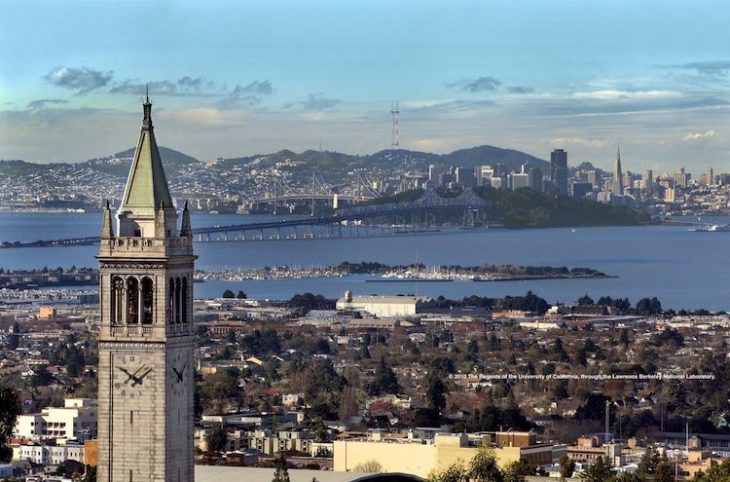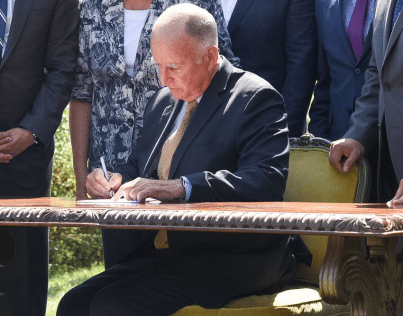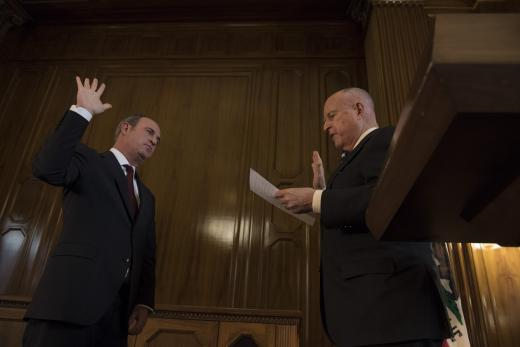
The Berkeley, CA Skyline. (Photo: Wikipedia)
California Supreme Court Orders UC Berkeley to Freeze Current Enrollment
Court rules that UC Berkeley violated CEQA, failed to provide adequate housing around campus
By Evan Symon, March 3, 2022 5:10 pm
The California Supreme Court ruled on Thursday that the University of California, Berkeley has to freeze enrollment due to violating the California Environmental Quality Act (CEQA) and failing to provide enough housing for students around campus.
UC Berkeley had long been challenged by residents, specifically the Save Berkeley’s Neighborhoods group, over drastically increasing enrollment and failing to provide enough housing to cover everyone. Between 2010 and 2020, attendance at UC Berkeley jumped up from around 36,000 students to 42,327 students, with the current student population even higher now at 45,057. State and University officials had been steadily increasing the numbers due to multiple new commitments to expand higher education for Californians, but at Berkeley, the increase in students caused the rental market to shrink, chased out low-income residents, increased homelessness and put a huge burden on city services with first responders, trash services, and others being more tied up and in-demand.

With the University not working with the city, the issue was brought before the Alameda County Superior Court. In August 2021, Judge Brad Seligman stunned the UC system by ordering UC Berkeley to cut it’s enrollment by 3,000 students back to 42,327. Many students looking to get in received letters informing them that, due to the decision, they needed to make cuts, panicking many.
The University appealed, only for an appellate court in February to refuse to end the enrollment halt. That decision caused Governor Gavin Newsom to get personally involved. He filed a friend of the court brief and asked the California Supreme Court to stop the enrollment freeze, noting how it would negatively effect students.
“We can’t let a lawsuit get in the way of the education and dreams of thousands of students who are our future leaders and innovators,” said Governor Newsom in his statement. “I urge the Supreme Court to step in to ensure we are expanding access to higher education and opportunity, not blocking it.”
However, on Thursday, the court rejected pleas from the state, University of California, and the Governor by upholding the lower courts ruling due to the CEQA law being held over the personal feelings and beliefs over higher education access in the case.
Reactions to the ruling
Many Berkeley residents and city protection proponents lauded the ruling on Thursday.
“For far too long the university had been pushing out people who called this home for decades,” said Marilyn Stein, a Berkeley apartment manager who had been personally affected by the higher enrollment, to the Globe on Thursday. “Students just keep shoring in, and some have tried to offer higher than asked for rents here just so they had a place to live. What college student does that? We needed to take back our city. We’re a city first, no a University first here, but a lot of people have not seen it that way. Maybe they do now. The higher enrollments were just hurting us so bad.”
However, many decried the freeze, including the University itself that now needs to drastically limit the number of planned admissions offers for the next academic year from 21,000 to 15,900 as a result.
“We are extremely disheartened by today’s ruling by the Supreme Court of California, which leaves intact a lower court order that will reduce and then freeze enrollment at 2020-2021 levels and prevent thousands of students who would have been offered in-person admission to the University of California, Berkeley, this fall from receiving that offer,” said the University in a statement. “This is devastating news for the thousands of students who have worked so hard for and have earned a seat in our fall 2022 class. Our fight on behalf of every one of these students continues.”
The University later added that, due to allowing in online enrollment, those leaving for study abroad programs, those leaving Berkeley without graduating, and the high number of winter graduates, the 2022-2023 class may only need to be cut by a few hundred students rather than a few thousand.
Despite this, multiple lawmakers continued to decry the ruling.
“Freezing enrollment at pandemic levels and denying thousands of highly qualified students a world class education is wrong,” said Berkeley Mayor Jesse Arreguin in a statement and tweet. “While the University must grow responsibly, it should not come at the expense of closing the door to students.
“Students are a valuable part of our community. The Court’s decision will result in the denial of a world class education to thousands of highly qualified students.”
Students are a valuable part of our community. The Court's decision will result in the denial of a world class education to thousands of highly qualified students. Read my statement on today's decision below: pic.twitter.com/UGDp1Cy99J
— Jesse Arreguin #GetVaccinated (@JesseArreguin) March 3, 2022
Senator Scott Wiener (D-San Francisco) specifically called out CEQA and environmental laws and announced that he would be introducing legislation to allow universities to build housing without needing CEQA permission as a result.
“It’s tragic that California allows courts and environmental laws to determine how many students UC Berkeley and other public colleges can educate,” said Senator Wiener. “This ruling directly harms thousands of young people and robs them of so many opportunities. We must never allow this to happen again. We must change the law. And we will.”
Wiener’s remarks led some to accuse him of turning his back on CEQA once again and trying to get more exemptions from a program that many in his party have touted as a need.
“Wiener and the others are essentially saying ‘This is a great law, except for all those parts of it that negatively affect what we want, so we’ll change it,'” explained Bay Area lawyer Robert Elkins in a Globe interview. “They were bested in court, so now they’re finding a way around the law.”
Because of the ruling, Berkeley stands to lose up to $57 million in tuition, but with California Supreme Court Justice Goodwin Liu noting that UC Berkeley could still try to request another stay or enter negotiations between parties. UC Berkeley is to send out admissions offers beginning March 23rd.
- Bill to Require Law Enforcement Disclosure if AI Was Used To Help Write Reports - August 7, 2025
- Gov. Newsom Files FOIA Request To ‘Expose True Cost’ Of L.A. Federal Troop Deployment for Anti-ICE Riots - August 6, 2025
- California Redistricting: How Newsom’s Plan Will Demolish Hard Fought GOP Gains - August 6, 2025





Seems to me that UC Berkeley was cashing in on out-of-state and foreign student enrollments. They need to serve California resident students FIRST and house them properly.
UC Berkeley, what are you going to do now? Admit based upon merit and residency? Probably not…you will continue to admit based upon “social justice” and top dollar international students.